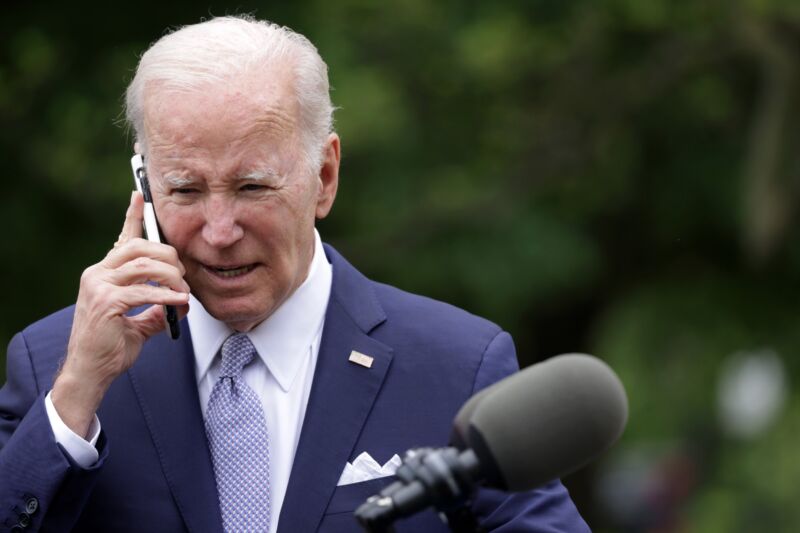
Getty Images | Alex Wong
A Democratic consultant was indicted on charges of voter suppression and impersonation of a candidate after admitting that he commissioned a robocall that used artificial intelligence to imitate President Joe Biden’s voice. The political consultant, Steven Kramer, is also facing a $6 million fine proposed by the Federal Communications Commission.
The fake Biden robocall urged Democrats not to vote and was placed to New Hampshire residents before the state’s presidential primary in January. Kramer, who was working for a candidate running against Biden, acknowledged that he was responsible for the robocall in February.
Kramer, a 54-year-old from New Orleans, “has been charged with 13 felony counts of voter suppression… and 13 misdemeanor counts of impersonation of a candidate,” New Hampshire Attorney General John Formella announced today. “The charges are spread across four counties based on the residence of thirteen New Hampshire residents who received the Biden robocalls.”
Formella said his office is still investigating the incident. “New Hampshire remains committed to ensuring that our elections remain free from unlawful interference and our investigation into this matter remains ongoing,” he said.
Separately, the FCC today proposed a $6 million fine against Kramer in a Notice of Apparent Liability for Forfeiture. Kramer will be given a chance to respond before the FCC makes a final determination on the fine.
“Political consultant Steve Kramer was responsible for the calls,” which “apparently violated the Truth in Caller ID Act by maliciously spoofing the number of a prominent local political consultant,” the FCC said. “The robocalls, made two days prior to the election, used a deepfake of President Biden’s voice and encouraged voters to not vote in the primary but rather to ‘save your vote for the November election.'”
Kramer defended fake Biden call
Kramer defended his actions after his role was revealed by an NBC News article. “Kramer claimed he planned the fake robocall from the start as an act of civil disobedience to call attention to the dangers of AI in politics,” NBC News wrote in February after talking to Kramer. “He compared himself to American Revolutionary heroes Paul Revere and Thomas Paine. He said more enforcement is necessary to stop people like him from doing what he did.”
“This is a way for me to make a difference, and I have,” Kramer told NBC News in an interview. “For $500, I got about $5 million worth of action, whether that be media attention or regulatory action.”
Kramer was working as a consultant for Democrat Dean Phillips, a US representative from Minnesota who ran against Biden in the New Hampshire Democratic primary. Phillips suspended his long-shot presidential campaign in March.
“Phillips and his campaign have denounced the robocall, saying they had no knowledge of Kramer’s involvement and would have immediately terminated him if they had known,” NBC News wrote. Kramer also said that Phillips had nothing to do with the robocall.
In early February, the New Hampshire AG’s office said the robocall was traced to a Texas company called Life Corporation and a person named Walter Monk. But the AG’s office said it was “continuing to investigate whether Life Corporation worked with or at the direction of any other persons or entities.”
Texas-based phone company Lingo Telecom was found to have transmitted the calls and is now facing an FCC fine. the FCC today proposed a $2 million fine against Lingo Telecom for “incorrectly labeling [the calls] with the highest level of caller ID attestation and making it less likely that other providers could detect the calls as potentially spoofed.”
The FCC alleged that Lingo Telecom violated rules related to the STIR/SHAKEN Caller ID authentication system. “Lingo Telecom failed to follow ‘Know Your Customer’ principles by applying the highest level attestation—signifying trust in the caller ID information—to apparently illegally spoofed calls without making any effort to verify the accuracy of the information,” the FCC said.
